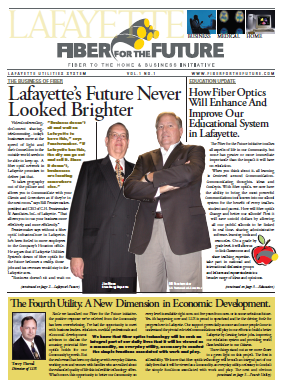
Fast, affordable Internet access for all.

A new documentary from California explores the failure of the private sector and competition more generally to sufficiently invest in fast, affordable, and reliable access to the Internet. It comes in three parts and runs about 25 minutes in total.
This provides a good summary of the present broadband landscape and how AT&T, Comcast, and other major providers are not the answer to our increasing need for better connections to the Internet.
Another video from the University of Wisconsin Extension Service's broadband stimulus project, Building Community Capacity through Broadband, which we have been covering here.
This video looks at why these community networks are needed and how private partners look at the project. These communities are often limited to much slower networks that are nonetheless priced higher than connections in larger cities. Community networks benefit residents and local businesses by creating competition, offering higher capacity connections, and lowering prices, often by working with private sector partners.
This video is no longer available.The Personal Telco Project is a 501(c)(3) non-profit organization located in Portland, Oregon dedicated to the idea that people have a central role in how their networks are operated. We do that by building our own networks that we share with our communities, and by helping to educate others in how they can too. To date, we have done this using Wi-Fi technology. We began in 2000 by turning our own houses and apartments into wireless hotspots (or "nodes"), and then set about building networks in public locations such as parks and coffee shops. There are currently about 100 active nodes participating in our project. We would like to see people and businesses in every corner and on every block of the city participating.They have been involved in the discussion in Portland over how the City can ensure all residents and businesses have access to affordable, reliable, and fast connections to the Internet. I was just reminded of them by a video that discusses their work and some of the reasons communities need to build their own networks (below). They also have a YouTube channel with more videos about community broadband.
 The newsletter also has a word from the Mayor (the inimitable Joey Durel) and quotes the Greater Lafayette Chamber of Commerce Broadband Policy. Finally, it also explains why the Lafayette Utilities System should build the network and cites successes from BVU in Bristol, Virginia.
Groups that are looking for strategies or a template for a web presence should check out Lafayette Coming Together. This was the organizing site they used in building support for the network, as a complement to Lafayette Pro Fiber. Unfortunately, the Fiber Film Festival web page no longer exists, but the most popular video (Slick Sam Slade) is still around - and embedded below.
An old episode examining the arguments around the network is still viewable (for Windows users) via the Louisiana Public Broadcasting archives -- look for episode #2844.
The newsletter also has a word from the Mayor (the inimitable Joey Durel) and quotes the Greater Lafayette Chamber of Commerce Broadband Policy. Finally, it also explains why the Lafayette Utilities System should build the network and cites successes from BVU in Bristol, Virginia.
Groups that are looking for strategies or a template for a web presence should check out Lafayette Coming Together. This was the organizing site they used in building support for the network, as a complement to Lafayette Pro Fiber. Unfortunately, the Fiber Film Festival web page no longer exists, but the most popular video (Slick Sam Slade) is still around - and embedded below.
An old episode examining the arguments around the network is still viewable (for Windows users) via the Louisiana Public Broadcasting archives -- look for episode #2844.
The Building Community Capacity through Broadband project from the Extension Service of the University of Wisconsin has released a new video about remote education opportunities that require broadband. We covered their previous video here.
In it, we learn that some of these remote learning programs are closed to people using dial-up. I wonder how many years it will be until those with basic DSL are similarly shut off due to their hobbled capacity.
This video is no longer available.A common misconception is that local governments award exclusive (or monopolistic) franchises to cable companies and that is why the US has so little cable competition. However, no local government has done this since the 1996 Telecommunications Act 1992 Cable Act made the practice illegal.
But even before the '96 Telecom Act '92 Cable Act, local governments tended to award non-exclusive contracts to cable companies because they wanted more competition, not less -- as illustrated in this article about Cox preparing to renew its franchise agreement with New Orleans.
Federal laws and Federal Communications Commission decisions also have sharply curtailed the city's negotiating ability. Even if other companies were seeking permission to provide cable to local customers, said William Aaron, a legal adviser to the council on telecommunications issues, council members could not arbitrarily refuse to renew the Cox franchise. The council could do that only on the basis of certain limited criteria, such as that the company has not lived up to the terms of the 1995 agreement. Cox has had a nonexclusive franchise to operate in Orleans Parish since 1981, meaning that other companies also can apply to provide cable services, though none has done so. The franchise was renewed in 1995.For years, state and federal policies have limited local authority to require just compensation for access to the valuable right-of-way because the cable and telephone companies pretended that they would invest more and create competition if local authority were preempted. Local authority has been significantly preempted in many communities without any real increase in competition or lowering of prices. No surprise there - another victory for companies better at lobbying than providing essential services.